Spurned by the international community, ignored in the land of its founding and ridiculed by many of its own people, the Republic of China (ROC) celebrates the 100th anniversary of its birth on Monday, trying to stave off extinction.
It seems a tall order for a regime that was born out of the ashes of China’s last imperial dynasty and once ruled over all of China. For the past 62 years it has been confined to the island of Taiwan.
The ROC’s longtime antagonist is the People’s Republic of China in Beijing, which ever since Mao Zedong’s (毛澤東) Communists defeated Chiang Kai-shek’s (蔣介石) Nationalists in 1949, has been committed to bringing Taiwan under its control.
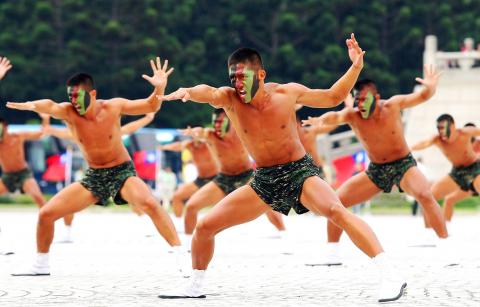
Photo: CNA
Nobody expects the nation of 23 million people to be subsumed into China in the near-term, but deepening economic ties are drawing Taiwan ever deeper into the orbit of its much larger neighbor.
“In the long term, the existence of the Republic of China is under threat,” said China specialist Yitzhak Shichor of Israel’s University of Haifa. “China is becoming more and more powerful, and Taiwan’s dependence on it is increasing.”
So far most of the interaction between the two has been economic. Since taking office three-and-a-half years ago, President Ma Ying-jeou (馬英九) of the Chinese Nationalist Party (KMT) has shepherded a series of commercial agreements aimed at linking Taiwan’s high-tech economy to China’s lucrative markets.
One payoff has been the lowest level of tension across the Taiwan Strait since Chiang’s desperate retreat from China in 1949.
The policy has come under strong criticism from the Democratic Progressive Party (DPP), which sees it as a step toward political integration with China. Ma denies that, but he has been vague about the end goal of his China policy, prompting speculation that he has accepted that union with China may be inevitable at some point.
His government is marking the centenary of the ROC not on the actual date of its founding — Jan. 1, 1912, but two-and-a-half months earlier on the 100th anniversary of an attack launched by rebels associated with revolutionary leader Sun Yat-sen (孫逸仙) on a Qing dynasty garrison in the central Chinese city of Wuhan.
The attack set the stage for the end of about 2,000 years of Chinese imperial history and raised hopes that China could emerge from a century-and-a-half of national humiliation it had endured at the hands of foreign powers.
Public interest in the centenary is lukewarm. While most Taiwanese do not want to come under China’s control, they also do not see the events of 100 years ago as particularly relevant to their future. The media have barely acknowledged a series of heavily promoted government events in the run-up to Monday’s ceremonies and the big day looks likely to pass with a minimum of fanfare.
Leading the ranks of the disinterested is the DPP, which remembers with horror the Martial Law era that Chiang brought from China and it associates the era directly with the ROC.
The DPP’s main constituents are descendants of people who migrated from China in the 17th and 18th centuries. Many of them reject any association with China in favor of a culturally and politically distinct Taiwan.
“The Republic of China was forced on the Taiwanese people when the Chinese Nationalist Party came to Taiwan in 1949,” said 41-year-old businessman Kuo Yen-chen of suburban Taipei.
A major stumbling block to integration between Taiwan and China are differing political systems.
Even among members of the KMT, many of whom trace their roots to those who fled in 1949, there is no unanimity on Taiwan’s future. Most want to continue Taiwan’s de facto independence indefinitely, while a small minority favor absorption by China, perhaps with a special status similar to Hong Kong.
Taking part in Monday’s ceremony will be representatives of Taipei’s tiny diplomatic corps, whose size is emblematic of the government’s continuing struggle with international legitimacy.
The rush to recognize Beijing underscores China’s rise and Taiwan’s relative decline. While still a major force in information technology, Taiwan is no longer the economic or political force it once was.
All this provides a validation of sorts for Chinese historians, who are virtually unanimous in declaring the ROC a relic of the past.
“All the academics in China who study Republic of China history believe that the ROC started in 1912 and ended in 1949,” historian Chen Hongmin of Zhejiang University in Hangzhou said. “After the foundation of the People’s Republic of China, the ROC ceased to exist.”
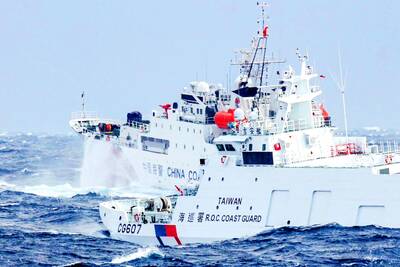
READY: The CGA said it closely monitored China’s maritime exercise, deployed vessels to shadow the Chinese ships one-on-one and set up emergency response centers Chinese navy and coast guard ships have returned to China, signaling the end of a massive maritime exercise, authorities said yesterday. The Coast Guard Administration (CGA) released images it said showed Chinese vessels sailing north in rough seas past Taiwan on Thursday, on their way to China. “All the Chinese coast guard went back to China yesterday, so although they have not officially made any announcement, we consider it over,” CGA Deputy Director-General Hsieh Ching-chin (謝慶欽) said. Beijing has not confirmed the drills and the Chinese Ministry of National Defense did not say whether the maneuvers had taken place when asked at a
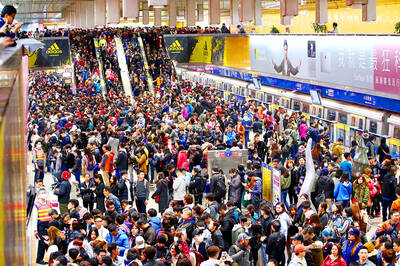
People can take the Taipei MRT free of charge if they access it at Nanjing Sanmin Station or Taipei Arena Station on the Green Line between 12am and 6am on Jan. 1, the Taipei Department of Transportation said on Friday, outlining its plans to ease crowding during New Year’s events in the capital. More than 200,000 people are expected to attend New Year’s Eve events in Taipei, with singer A-mei (張惠妹) performing at the Taipei Dome and the city government’s New Year’s Eve party at Taipei City Hall Plaza, the department said. As people have tended to use the MRT’s Blue or
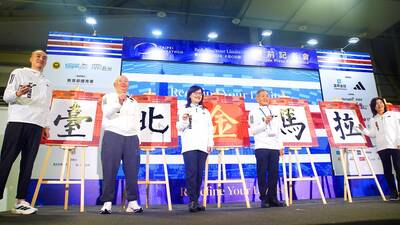
PUBLIC TRANSPORT: As some roads would be fully or partially closed, people are advised to take the MRT, with services expanded to accommodate more riders This year’s Taipei Marathon, which has obtained its first gold label certification from World Athletics, is to be held from 5am to 1pm tomorrow and would have 28,000 participants. The race is to start from the Taipei City Plaza and would go through major roads throughout the city, with traffic control implemented from 6am to 2pm, officials said. The Taipei Mass Rapid Transit (MRT) system and New Taipei City MRT Circle line would start operating at 5am on the day of the race, they said. The race would cover Renai Road, Xinyi Road, Hangzhou S Road, Aiguo east and west roads,
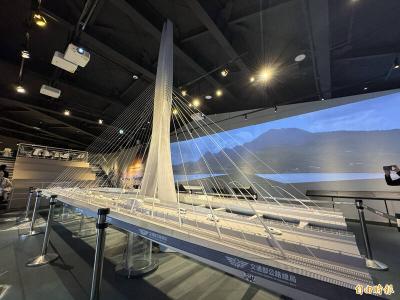
Upon its completion next year, the new Tamkang Bridge (淡江大橋) in New Taipei City is to be an important landmark in Taiwan, alongside Taipei 101, Minister of Transportation and Communications Chen Shi-kai (陳世凱) said today. The bridge is scheduled to be completed in December next year and open to the public in the first half of 2026, connecting New Taipei City’s Tamsui (淡水) and Bali (八里) districts. It is an asymmetric single-tower suspension bridge, nearly 70 stories tall, designed by world-famous architect Zaha Hadid. The bridge aims to alleviate traffic in Tamsui and on the Guandu Bridge (關渡大橋), in addition to increasing the